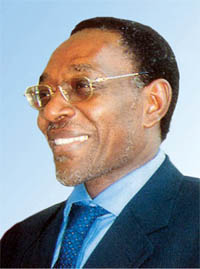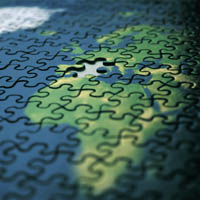The Yaoundé Declaration: What it means
for Africa

Maximin Paul Nkoue Nkongo
Minister of Posts and Telecommunications
Cameroon
On 28 May 2001, African ministers
responsible for telecommunications, assembled in Cameroon to prepare for the
World Telecommunication Development Conference (WTDC-02) scheduled to take place
in Istanbul from 18 to 27 March 2002, adopted a joint strategy for bridging the
digital divide that separates the North from the South and urban areas from
rural areas.
Known as the “Yaoundé Declaration”,
the strategy is one of several initiatives adopted in recent years by the
African plenipotentiaries and by other multilateral meetings. It reflects in
particular the active solidarity now breathing new vigour into the continent,
and a new awareness which is a strategic departure from earlier initiatives.
Furthermore, the Yaoundé Declaration embodies the new vision which Africa
plans to convey to the world by implementing the New Partnership for Africa’s
Development (NEPAD).
WTDC-02 and the Yaoundé Declaration
With Istanbul in mind, Africa’s
first step was to take stock of progress in the implementation of the Maitland report, The Missing Link, published in 1985. The aim of the report was
to redress the balance in the number of fixed telephone lines between developed
and developing countries. Africa noted that, despite the noble aims stated in The
Missing Link and the efforts made so far, the situation on the ground has
remained static. What is more, nearly two decades on, the situation has been
compounded by a new concept: the digital divide, on which all telecommunication
development strategies are now focusing.
Through the Yaoundé Declaration, Africa is appealing with
one voice to decision-makers, firms, equipment manufacturers, funding agencies
and information technology specialists to ensure that the right solution is
found to close once and for all the huge gulf in the rate of penetration of
information technologies in daily life that separates the people of the North
from those of the Southern hemisphere, and Africa in particular.
What prompted the appeal was the meagre results yielded by
the enormous efforts which our States have undertaken, in vain, at the instigation
of the Bretton Woods institutions in order to restructure the telecommunication
sector. The Buenos Aires Action Plan (BAAP) set a target for the developing
countries of five telephone lines per 100 inhabitants in urban areas and one
line per 10 000 inhabitants in rural areas. The revolutionary growth of mobile
telephony in 2001 still leaves Africa with as few as 15 million subscribers,
and the advent of the Internet benefits barely 4 million users.
By adding the Yaoundé Declaration to prevailing development
strategies for Africa, in particular NEPAD, our region is expressing its
appreciation of the encouraging contributions it has received from countries of
the North and ITU’s cooperation in the continent’s telecommunication
restructuring process. Thanks to them, the rate of connectivity is rising in our
cities.
Africa also wishes to alert the international community to
the limited nature of results so far and to convince it that mentalities in the
continent are in the throes of radical change. The concept of democracy has
spread throughout the continent, overthrowing the established order and
challenging traditional values. People are constantly making painful sacrifices
as they cope with economic crises and demanding structural adjustment
programmes, impoverished as they are by falling prices of agricultural goods and
armed conflict which is destroying the meagre infrastructures in place today.
The struggle against poverty and the establishment of good
governance in public affairs are, without doubt, signs of an awakening on the
continent — an awakening that can no longer be reversed. For all these reasons,
the West has an historic and humanitarian duty to support, without any new
conditions, the elimination of the digital divide, as advocated by the Yaoundé
Declaration.
 With the necessary resolve, a digital Africa can be built and
will give globalization greater coherence. The Yaoundé Declaration is both a rational and an emotive plea from
a
continent in search of equity and fairness in the development of ICTs With the necessary resolve, a digital Africa can be built and
will give globalization greater coherence. The Yaoundé Declaration is both a rational and an emotive plea from
a
continent in search of equity and fairness in the development of ICTs
Photo: PhotoDisc
(ITU 010053)
|
It is against this backdrop that WTDC-02 is taking place.
Africa will be going to Istanbul full of hope and with the conviction that the
world will be more attentive to its problems. The Yaoundé Declaration, which
sums up all the proposals set forth in the various regional and subregional
initiatives, lays down guidelines for the work that will be done at Istanbul on
the digital divide. It is Africa’s intention to obtain from WTDC-02 new
measures to encourage, in particular:
-
an increase in teledensity in our States so that
telecommunications can play its role as an economic catalyst;
-
implementation of pilot projects conducive to universal
access in Africa;
-
more sustained establishment of equipment manufacturers
with a view to developing appropriate technologies at lower cost as a
means of increasing teledensity on the continent;
-
instant access for people in all corners of the continent
to all forms of information, the key to a new society in which people will
acquire broader freedom;
-
training, human resources development and
capacity-building in information technology;
-
financial flows from funding agencies to support
telecommunication infrastructure development programmes for the benefit of
inhabitants in the rural areas of our continent.
 The entire continent has opened up its telecommunication
networks to operators the world over The entire continent has opened up its telecommunication
networks to operators the world over
Photo: R. Woodridge
(ITU 020026)
|
What gives these hopes and ambitions their legitimacy is the
fact that the entire continent has accepted to open up its telecommunication
networks to operators the world over.
Those who are reticent argue the need for short-term
financial returns. The counter-argument is that our society is seeking to
acquire the information and communication technologies (ICT) it needs for
development. With the necessary resolve, a digital Africa can be built and will
give globalization greater coherence. The Yaoundé Declaration is both a
rational and an emotive plea from a continent in search of equity and fairness
in the development of ICTs.
|